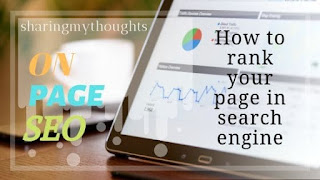Boost
Your Website's Ranking with These Essential On-Page SEO Techniques
On-page
SEO is the process of improving individual web pages to improve their search
engine rankings and attract more relevant visitors.
It
comprises aspects like content, HTML tags, keywords, meta descriptions,
internal linking, and other technological components that you have influence
over on your website.
Good
on-page optimisation increases the relevance of your website to particular
search queries by helping search engines comprehend your content better.
The
following are some of the most crucial on-page SEO elements that can have a big
impact on how well your website ranks:
- Fast Loading Page
- SEO Friendly URL
- Keyword in Title Tag as well as in
the Meta Description Tag
- Image Optimization
- Linking Internal and External Pages
- Proper formatting
- Social Media Sharing Buttons
1. Fast Loading Page
Just imagine that you are searching
something on "Google" and you get the results, after getting the results, you
clicked on one of the link, and it took long time to open that link.
The question is, will you wait or
will you click on the other link ?
Definitely, after waiting for
few seconds, you will click on the other link.
So therefore, as soon as someone
clicks on your page, it should open quickly. If the page doesn’t open quickly,
viewers will go to the other page.
As per the study most of the users
don’t stay on the page, if the page takes more than 5 seconds to load.
So, therefore you need to optimize
your page.
First check the speed of your web
page through "GTmetrix". From this website you will come to know how much time
your page takes to load. If you are not happy with your page speed of your
website, then do some necessary changes as suggested by gtmetrix or else change
the template.
First see which template will help
your website to load fast, and accordingly select the template. You can get
free template on "gooyaabitemplates"
After uploading the template, try to
remove those tabs, which are not necessary.
Try to keep minimum ads on your page.
These
were the few points, which will help your page to load fast.
Fast
Loading page is one of the important factor in On-Page SEO.
2. SEO Friendly URL
Search
Engine Optimization ( SEO ) Friendly
URL ( Uniform Resource Locator ) means the URL of the particular page needs to be properly
structured.
How
to create SEO friendly URL
Let’s
see step by step
For example:
If you are writing an article with the keyword “whatsapp” and the title of your article is “Whatsapp Messenger : Media Visibility”. Then the URL of the page
can be structured as “whatsapp-messenger-media-visibility”.
This can be treated as SEO Friendly URL,
because the keyword is there in the title of the article as well as in the URL of
the page.
For
the blogspot blogger, one can custom the URL as per their convenience.
Go
to control panel of blogspot
Click
on “All Post” and
thereafter
click on “Edit” and at the right
side of the edit page you will see the option “Permalink” click on it. You will get 2 option
- Automatic Permalink
- Custom Permalink
Click
on custom permalink and edit accordingly
For
example : “whatsapp-messenger-media-visibility”
In
this way, you can create SEO friendly URL
3. Keyword in Title Tag as well as
in the Meta Description Tag
The
keyword which you are targeting for writing an article, that keyword should be
there in your Title Tag as well as in the Meta Description Tag
For
example suppose you are targeting a keyword “whatsapp”
And
you want to write an article on Whatsapp
Business Account
Then
you can write
Meta
Description tag as : “This article talks
about how to create whatsapp business account”
As
per the study
The
length of the title tag should not be more than 70 characters.
The
length of the description tag should not be more than 160 characters.
4. Image Optimization
Image Optimization
is also considered as one of the factor in On-Page SEO.
In
your post at least one image need to be there. It is not mandatory, but without
image you cannot make your post appealable to the viewers. Image helps to draw
the attention of the users towards your post.
As
per the study one should upload the image, which file size should be less than
50 Kilo bytes ( kb) and it should be in JPEG format, because lower the size of
the image faster the page will load, as we spoke in the first point of our
article, how fast loading page is important in On-Page SEO.
So,
therefore one should Optimize the image, before uploading the image.
For
optimizing the image, I have written an article on “Image Optimization” where you will be able to know how to optimize the
image.
Once
you have optimized the image few things you will need to do.
For example :
If
you are writing an article on “WhatsappStickers”. Then, the image which you have optimized shall be named as “whatsapp-stickers”
Name
the image file as per your title of the article.
After
uploading the image, in the edit section of your blog, click on the image, after
that click on the properties, you will get 2 option
Write
the title of your article on both the space, that is, “Whatsapp Stickers” at the Title Text as well as at the Alt Text and
after that click on ok.
5. Linking Internal and
External Pages
Internal Linking
In
your article you should try to give the link of your earlier articles. I always
try to give the link of the earlier articles, at the end of the articles.
In
this article you can see that I have given various earlier post links within
the articles.
In
similar way you can also try to give the link of your earlier articles. This
technique will help you to reduce the bounce rate of your page.
External Linking
External
Linking means giving link of the other website for better information or understanding
For example :
I
have created the images of this article with the help of the website named “Canva”.
You
can see that, I have given a link on the word Canva. In this way you can create
an external link.
6. Proper formatting
Try
to give proper heading, subheading, minor heading throughout your article, this
is also one of the elements which is considered in the On-Page SEO
Give
bullet points wherever necessary.
If
you write a content and that content has table. Make sure your table is not wider
than screen. In desktop the content might look proper, but in mobile, sometimes
the content gets wider than the screen. This happens sometimes when yours blog
theme is not responsive or might be because of some other reason.
Proper
formatting will help your page to be “Responsive”
7. Social Media Sharing
Buttons
In
today’s world social media helps to drive the traffic on your blog. So
therefore, it is necessary to have social media sharing buttons on your blog
such as
If
the visitors likes your article, then the visitors will definitely share your
article in their social media pages. Which will help your website or blog to
get traffic and slowly and steadily your page will get ranked.
Conclusion
In
this way you can optimize your website's on-page SEO with these important
techniques.
With
the help of keyword research, URL structure, title tags, content optimization,
image optimization, internal linking and so on, you can improve your website's
relevance, authority, and visibility in the search engine results pages.
So
these were the most important On-Page SEO elements or On-Page SEO tips, recommendations or factors, which you should
consider while writing an article, by doing so, your page might get rank in
search engines.
I
hope you like this article....
Kindly comment below and share your
thoughts, which are the other important elements of “On-Page SEO” according to
you.
Also Read :
How many states are there in India ?
Redmi7A : Key specification and price in short
VivoZ1 Pro : Key specification and price
If
you want more articles related to Latest Technology, Tech News, Latest Mobile,
Apps etc. then stay tuned with us at “sharingmythoughts”.
Disclaimer:
We, as sharingmythoughts, cannot say
that the information on this page is 100 percent correct.



